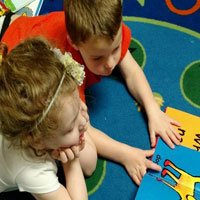Ages 14 months to 60 months.
 Our Intensive early intervention services combine both structured setting and natural learning environments depending on the learning activity and targeted skill. Using structured tasks provides an opportunity for children to learn with fewer distractions. A child led approach provides opportunities for your child to learn the natural consequences of cause and effect behaviors such as, requesting an item prior to receiving it.In Shiloah Intensive early intervention services combine both structured setting and natural learning environments depending on the learning activity and targeted skill. Using structured tasks provides an opportunity for children to learn with fewer distractions. A child led approach provides opportunities for your child to learn the natural consequences of cause and effect behaviors such as, requesting an item prior to receiving it.
Our Intensive early intervention services combine both structured setting and natural learning environments depending on the learning activity and targeted skill. Using structured tasks provides an opportunity for children to learn with fewer distractions. A child led approach provides opportunities for your child to learn the natural consequences of cause and effect behaviors such as, requesting an item prior to receiving it.In Shiloah Intensive early intervention services combine both structured setting and natural learning environments depending on the learning activity and targeted skill. Using structured tasks provides an opportunity for children to learn with fewer distractions. A child led approach provides opportunities for your child to learn the natural consequences of cause and effect behaviors such as, requesting an item prior to receiving it.
Environments are arranged to stimulate interest through the use of preferred items, desired activities and novel items. This provides the child with opportunities to engage in activities of their choosing. Play skills, social skills and verbal behavior are also targeted and incorporated throughout the child's program.
Academics, visual and performing arts, social skills, communication, life skills, ABA therapy, speech therapy and much more to extend our children's engagement, that they may more fully unfold their potential, and that they more fully and meaningfully participate in life. With the heart of everything we do. The programs chosen for each child are tailored to his/her unique needs. Some will include mostly PLAY SKILLS, whereas others will focus on ACADEMICS or SOCIAL SKILLS, SELF-HELP SKILLS, COMMUNICATION SKILLS.
A 2014 study published in the Journal of Autism and Developmental Disabilities found that parents of infants can help significantly reduce symptoms of autism by changing how they interact and play with their infant. This is important news for parents, professionals and childcare providers of children as young as six months.
The early intervention focuses on engaging a baby's attention in everyday activities with the parents, such as focusing on parent's faces and voices, practicing interactions that cause joy and smiling and using toys to encourage social activity.
Early Start helps parents read their babies' subtle cues and provides parents with additional strategies and tools to engage their babies. Autistic children may take longer to pick up social cues or may not respond the way other babies do, such as smiling frequently and cooing.
Early Start teaches parents that they may need to alter the way they interact with their baby and persist a little longer than feels normal to them.
Parents in the study participated in one-hour weekly sessions for 12 weeks with an Early Start therapist. By 18 to 36 months, 6 out of 7 of the babies in the study had lower autism severity scores than those who did not undergo the treatment.
This study reinforces that early intervention can make an enormous difference for babies and young children.
These disabilities can include autism, mental retardation, or Attention-Deficit/Hyperactivity Disorder (ADHD), as well as delays in language or other areas. Less than half of children with problems are identified before starting school. During this time, the child could have received help for these problems and may even have entered kindergarten more ready to learn.
